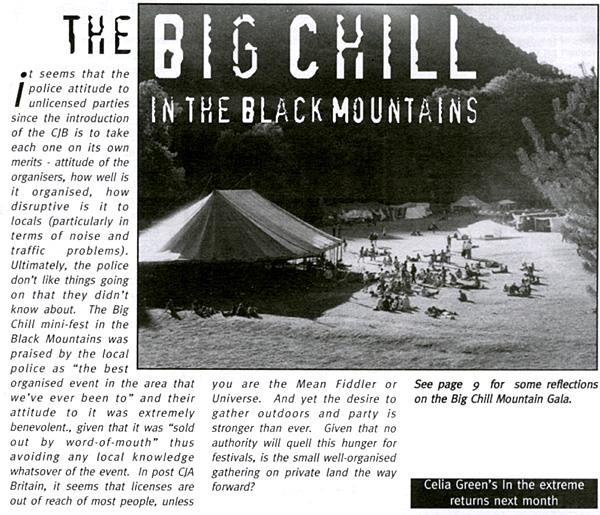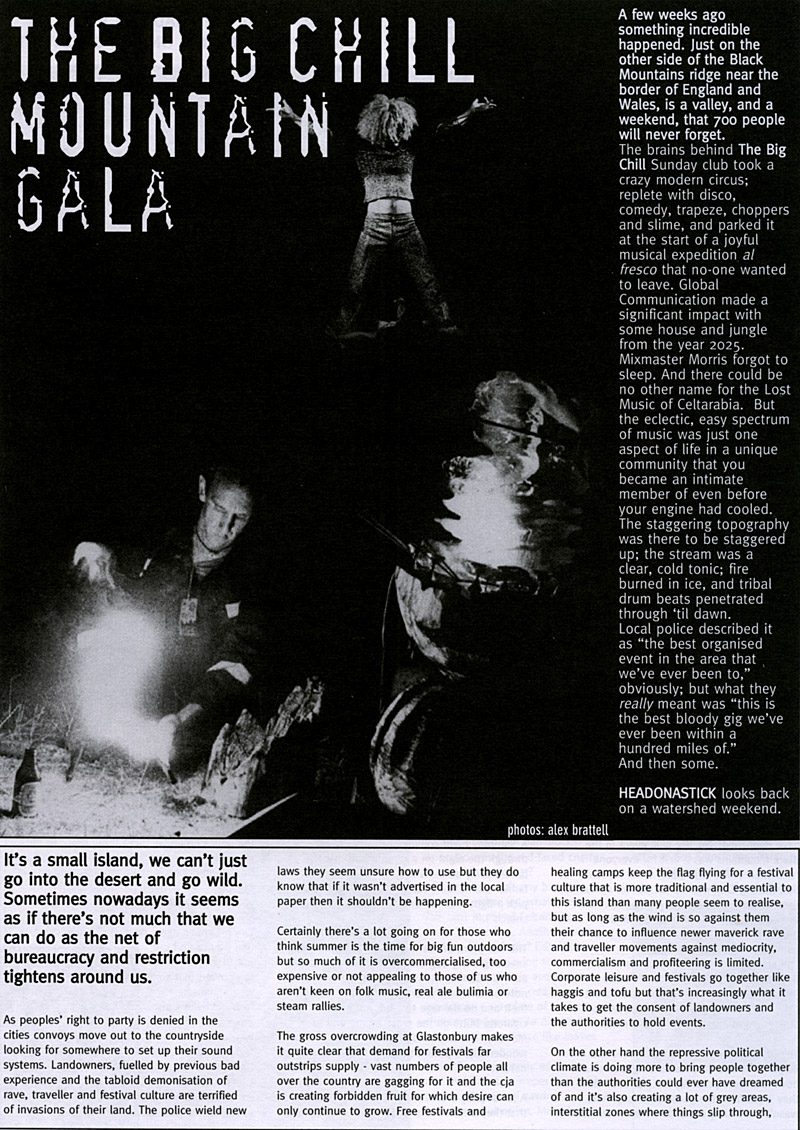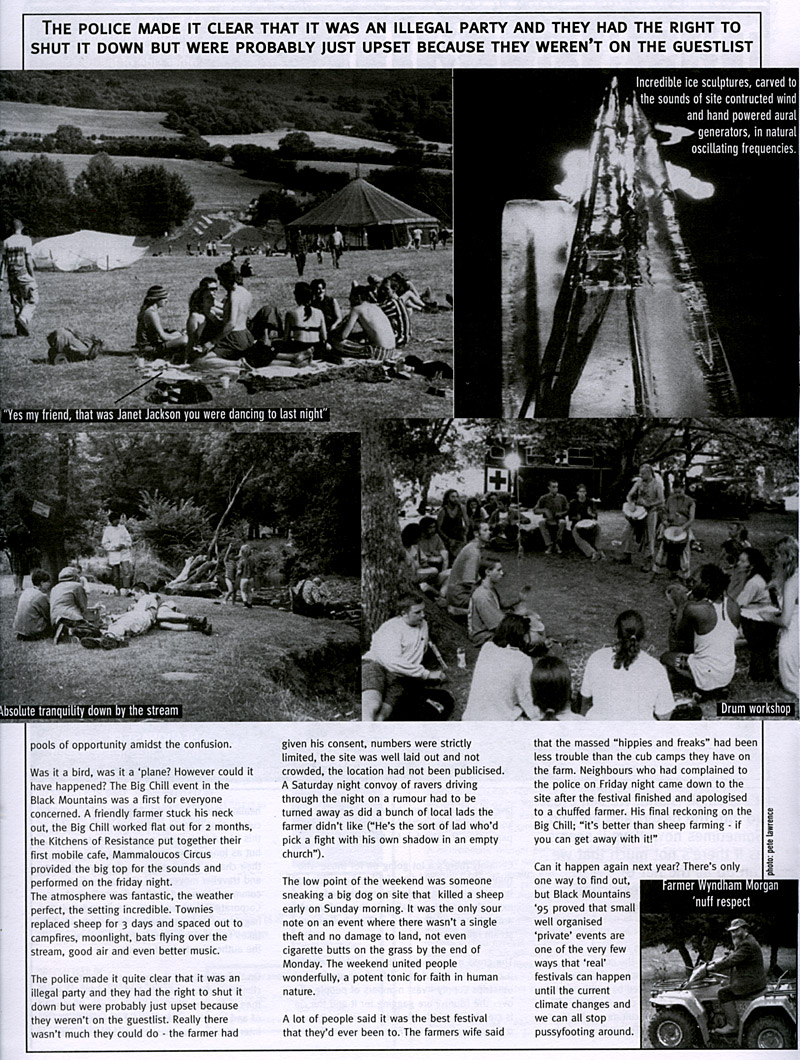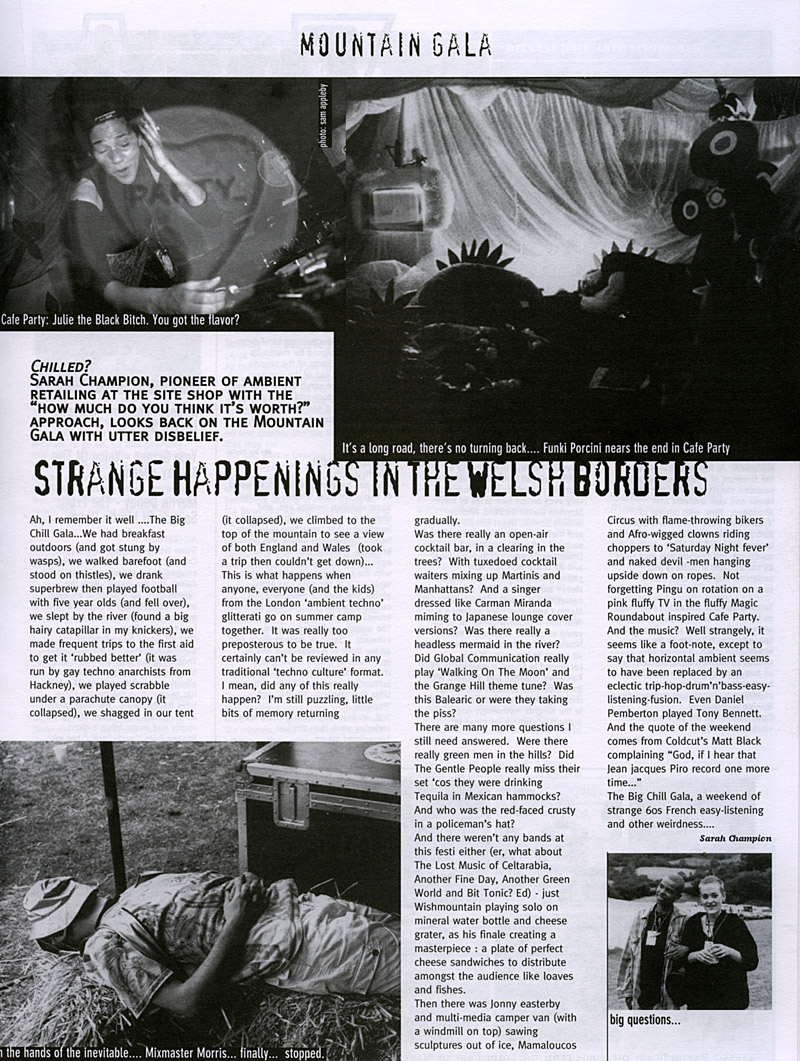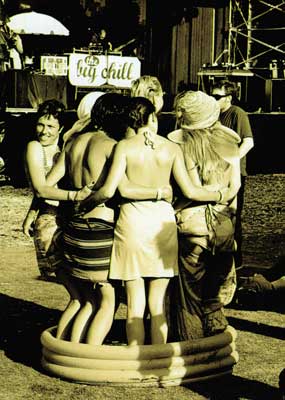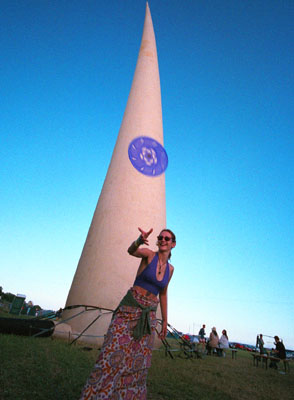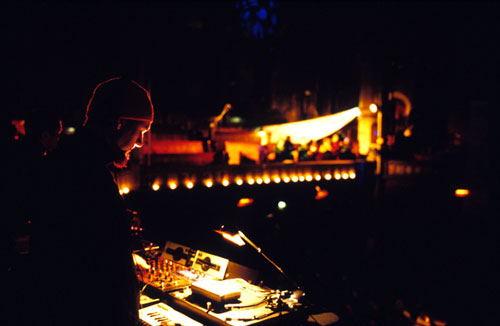|
An account by Alan James downloadable
from www.bigchill.net/media/1995firstfestival.doc
The Big Chill Gala was held in the summer of 1995 at
a secret location in the Black Mountains of Wales. It took place on
land owned by a hill farmer who shall remain nameless but with the typical
non-conformity of the people of his region let his camping field to
the fledgling Big Chill organisers and turned a blind eye to the usual
red tape. Essentially it was a private party for 500 or so people, the
scale of which in retrospect made The Enchanted Garden look like Glastonbury.
The Big Chill had spent a year or so putting on events at the Union
Chapel in Islington, North London, and was itching for a bucolic frolic
in and around one of Pete and Katrina's favourite holiday spots in the
Welsh Borders, the wonderful Maes-Y-Beran camping ground. A vast arena
of green and brown capped by blue ridges and expansive skies. The site
with its gazebo for HQ, one marquee for DJs and bands, a Circus Tent,
and an eccentrically stocked café nestled in the lee of Offa's
Dyke and was skirted on its other boundary by a stream which snaked
through knarled and stooping trees. It was a magnificent and imposing
setting. Nearby stood the famous ruins of Llanthony Abbey at which Oscar
Wilde had stayed and on which Alfred Watkins plotted the most famous
ley-line in the world, the mother of them all. Up on the Welsh side
of the valley a white, low-slung farmhouse was the supposed birthplace
of Pink Floyd's 'Dark Side of the Moon'. Down towards Hay end the artist
Eric Gill had founded a neo-pagan commune at Capel Curig. The area was
redolent with psychogeographical references and idyllic beauty.
The Ewyas, or Llanthony Valley, became midwife to the birth of a burgeoning
line of open-air chills, which stumbled into adolescence in 2002 with
7000 Chillers at Eastnor Castle. The valley is marked at one end by
the split peak of The Skirrid Mountain and Wales' oldest alehouse, and
at the other, by breathtaking views from Hay Bluff and the barely visible
remains of a stone circle. It is a magical place, first committed to
manuscript by wandering Monks in the 11th Century.
As we have established, the area had long held a fascination for creative
types and Iain Sinclair's latest book, 'Landor's Tower', focused on
an eighteenth-century landowner's doomed attempt to build an exotic
dwelling above the abbey and to plant landscaped gardens and lawns.
Some of the larger alien trees in the valley are the living archaeology
of Landor's early attempts at controlling the landscape. The monks had
colonised the area since the 12th century and quarried the stone needed
for their building from the hillside above, where they also dug fishponds
and grazed sheep. It is possible to conject that Bruce Chatwin's 'On
the Black Hill' was set here (a cottage called The Vision can still
be seen nearby, being marked clearly on the OS map).
Wayfinders, grid references and whispered directions were acquired and
transport booked. Local plod arrived and inspected the proceedings,
nodded his approval… and requested tickets for the family next
day. The party commenced.
Pete had selected the usual variegated blend of DJs, VJs and live acts,
and set them up with his customary words of encouragement: 'Play what
you will, it's the Big Chill.' This element of trust and respect is
at the heart of the artistic vision of the Chill and has remained at
the core of its aesthetic. Tom Middleton later took this to the first
of many post-modern extremes when he dropped the Grange Hill theme into
his set causing much ensuing mayhem. Morris slept on a hay bale after
a typical marathon set from Saturday night to Sunday morning. He was
serenaded by an hour of perfect classical music. The Gentle People floated
by and Matthew Herbert worried some kitchen utensils. George from Nightmares
On Wax set off up the side of the hill and re-emerged four hours later
after following various sets of conflicting directions. Jony Easterby
carved sonic slices off internally-combusting blocks of ice with a contact-mic'd
violin bow. A one-man inaugural art trail.
White clouds scudded across the ridge as Another Fine Day dropped the
sound of the stream into a total classic of a live set. Various Chillers
lost themselves in the landscape.
I stepped off the stage after becoming totally absorbed in my Sunday
afternoon set only to realise that I was still wearing the headphones,
the mixer decided to accompany me. Luckily a nimble Dr Jam saved the
day, springing cat-like to my rescue before proceeding to play a killer
rare soul, funk and jazz set.
Time to give the café a swerve and venture forth. We left the
site to eat at the hotel bar in the Abbey and realised that the setting
there was as unreal as the one we had just left – topped off by
an impressive Basil Fawlty management style. News arrived that ace photographer
Alex Brattell, on security duty the previous night, had sent vanloads
of Cheesy Quavers from Bristol looking to 'large it' off down Hereford
way. Did they wonder what he was doing stood in the middle of an isolated
road at midnight, and not realise that they were a mere handful of feet
above the site itself? Perhaps Alex was just too convincing, or was
it that in those days we seemed to chill at a much lower volume?
It was simply a great way to spend a weekend.
The writer EM Forster once famously employed the following to attempt
a definition of the notion of 'festival': 'A festival should be festive.
And it should possess something which is distinctive and which could
not be so well presented elsewhere.' Modern festivals in Britain have
a relatively short history, the first being Edinburgh People's Festival
organised in 1951 as an alternative to the International programme.
More recognisable to us perhaps, Sidmouth Folk Festival appeared in
1953 and has continued ever since. Now in the 21st century Britain is
full of outdoor concerts posing as festivals, but what a true festival
has is something that creates a synergy and an energy, which makes no
single attraction the headline feature – the event itself is the
star of show. This is one of the great strengths of the subsequent Big
Chill Gardens and Castles, no one artist or intervention encapsulates
the essence of the event. It is an experience approached via many portals,
for some it may be a seven-hour set by Morris, for others the Art Trail,
or perhaps even a first experience of camping in nature. It is the entire
experience, however, which makes the Big Chill what it is.
It is no accident that festivals have also been called Fayres. The best
of them have a sense of a roller-coaster ride of attractions and distractions.
The world turned upside down for three days, Lords and Ladies of misrule
let loose in the world to make it surreal. The effect can be transformative
whilst the return to normality is hard for some (check the Big Chill's
online forum for examples of this) and others just carry on with the
anarchy and never come back. It's hard not to be fanciful and think
of our just recent ancestors revelling in green wood bacchanals each
May Eve – the British have always liked their country pursuits.
In rural communities, which have been blighted in recent years, the
boost to the local economy generated by a weekend with music in the
fields is gradually being welcomed again rather than feared.
The Big Chill continues to find newer and more beautiful sites (sights)
for its festivals. But the Gala was the first and for that reason, in
many people's opinion, it will always be the best. I've been back to
camp there and have also seen it from high up on the Dyke path. It's
nothing but a green field full of memories. But from it grew a beautiful
thing.
Alan James – May 2002
The Black Mountains featured: Tom Middleton and Mark Pritchard (Global
Communication), Kirsty Hawkshaw, Matt Black, Springheel Jack, Nightmares
On Wax, Mixmaster Morris, Tuu, Paul Thomas, Rockitt, The Gentle Experience,
Bunny, Wishmountain, AJ, Goosebumps, Funki Porcini, Rephlex sound system,
Daniel Pemberton, Diversity Of Life, Bit Tonic, The Black Bitch, Another
Fine Day, Jony Easterby, Dr Jam, ease, DJ minutes 33, N4 Eric, Late
Night Bellyvision, Nelson Dilation, Micky Nice, Contrived & Exaggerated,
Strictly Kev, Simon Mu, Pete Lawrence, Jon Chillout, Virtual Dawn, The
Lost Music of Celtarabia, Higher Intelligence Agency, John Tye, Another
Green World, Mamaloucos Circus.
|


